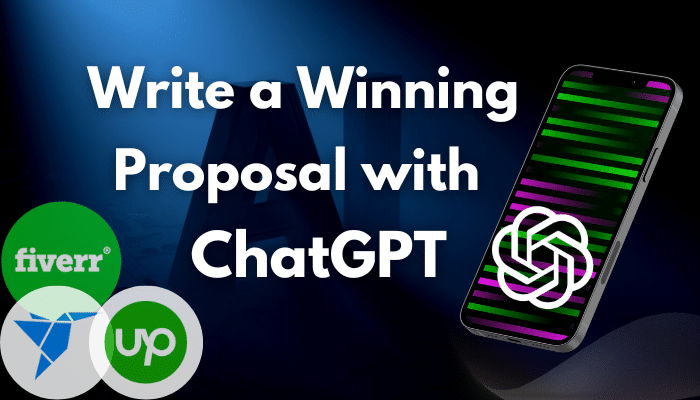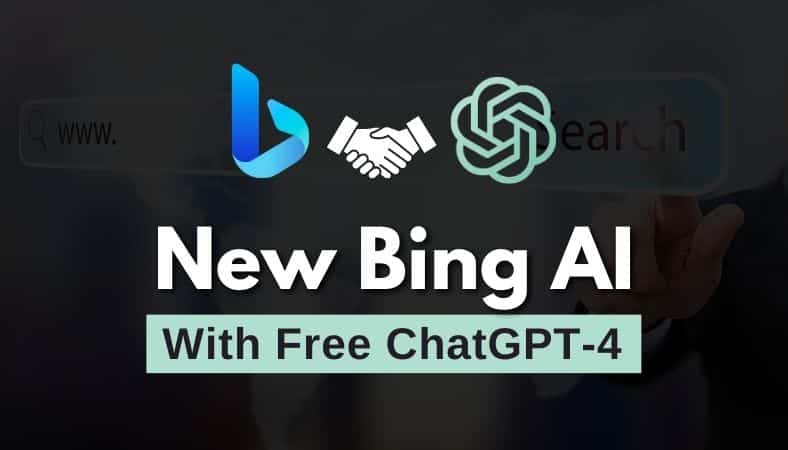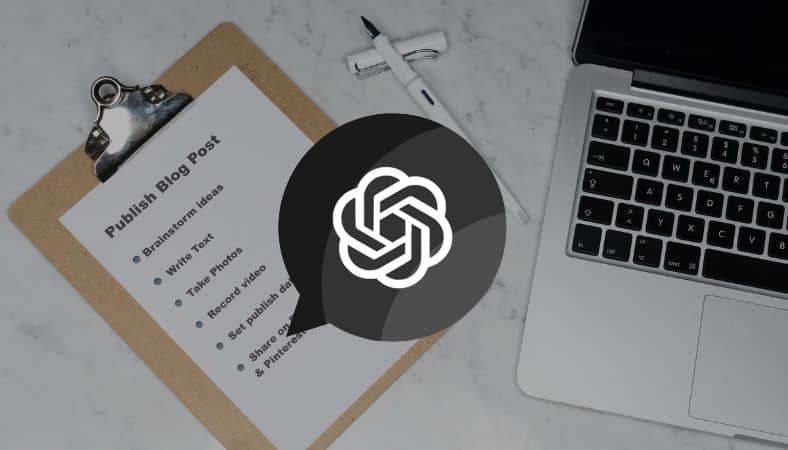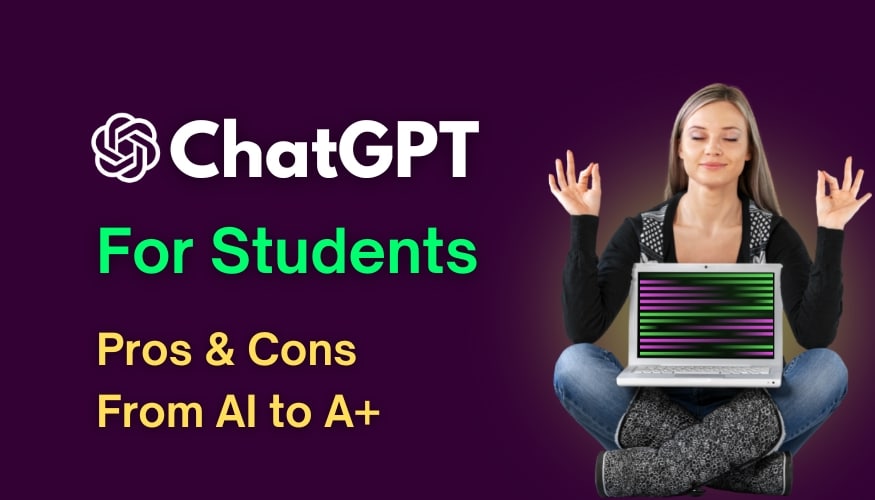
In today’s digital era, students have an abundance of resources to aid their learning process. Among these, ChatGPT has emerged as a popular study tool, thanks to its advanced natural language processing (NLP) technology. It can provide answers to a wide range of questions. However, the rise of ChatGPT has also sparked a debate on whether it is an ultimate study tool or a risky shortcut. In this article, we will explore both sides of the argument and help you decide whether ChatGPT is suitable for your academic needs, and provide some tips for using it effectively and responsibly.
What is ChatGPT?
ChatGPT is a large language model trained by OpenAI that can answer a wide range of questions. It is based on a neural network architecture that has been trained on massive amounts of text data and is capable of understanding natural language input and generating responses that are contextually relevant and accurate.
How Does ChatGPT Work?
ChatGPT works by analyzing the input text provided by the user and generating a response based on its understanding of the text. It uses a technique called “transformer architecture” to encode the input text into a fixed-length vector, which is then used to generate the response. The model is trained on massive amounts of text data, which allows it to understand and respond to a wide range of questions.
If you’re a freelancer too, then you should must read this: Boost your pruductivity and income as a Freelancer with ChatGPT.
Examples: How Students Can Use ChatGPT?
There are many ways that students can use ChatGPT! Here are a few examples:
- Research Assistance: If students are struggling to find information for a research project or essay, they can ask ChatGPT for help. ChatGPT can provide information on a wide range of topics and can even help students refine their research questions.
- Homework Help: If students are stuck on a specific problem or question, they can ask ChatGPT for guidance. ChatGPT can provide explanations and examples to help students better understand the concept.
- Study Aid: If students are preparing for an exam or quiz, they can use ChatGPT to generate study materials. ChatGPT can create flashcards, practice questions, and even summarize key concepts.
- Writing Assistance: If students are struggling to write an essay or paper, they can ask ChatGPT for writing tips and advice. ChatGPT can provide guidance on things like thesis statements, topic sentences, and paragraph structure.
- Language Learning: If students are learning a new language, they can use ChatGPT to practice their language skills. ChatGPT can help students with grammar, vocabulary, and pronunciation.
- General Knowledge: If students have questions about anything from history to science to current events, they can ask ChatGPT for information. ChatGPT can provide quick and accurate answers to a wide range of questions.
My Prompt: Solve this calculus question for grade 12: Find the derivative of f(x) = 3x^4 – 2x^3 + 5x – 7.
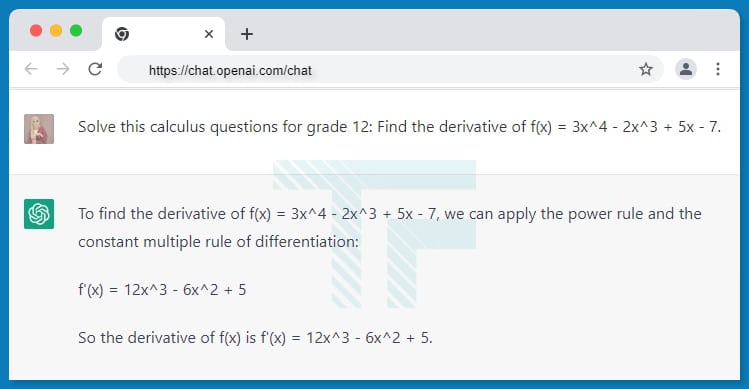
My Prompt: I’m not understanding it properly. Teach me like a tutor.
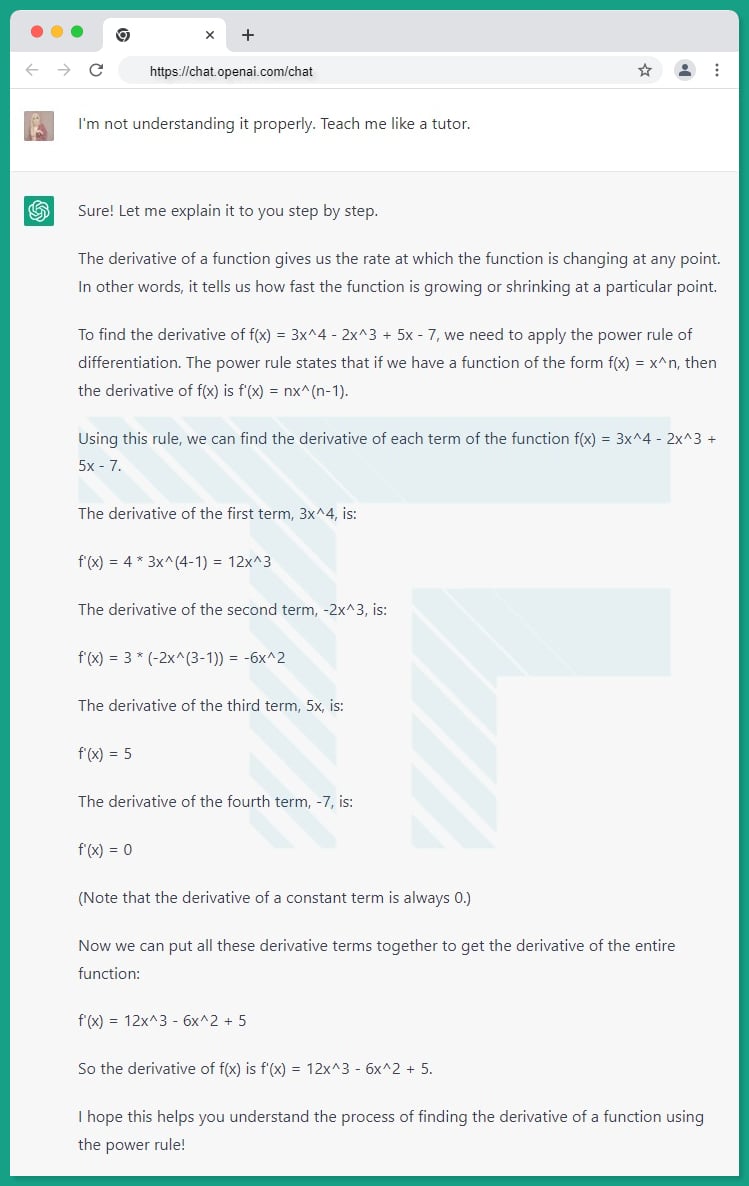
Pros of Using ChatGPT for Students
There are several potential benefits of using ChatGPT for students. Here are some of the most important:
- 24/7 Availability
ChatGPT is available 24/7, making it convenient for students to get assistance at any time, regardless of their location.
- Quick Answers to Questions
One of the main benefits of using ChatGPT is that it can provide quick answers to a wide range of questions. Students can ask it anything from “What is the capital of France?” to “How do I solve this calculus problem?” and get an answer within seconds.
- Access to a Wealth of Information
ChatGPT has been trained on massive amounts of text data, which means that it has access to a vast amount of information. This can be particularly useful for students who are researching a particular topic or trying to understand a complex concept.
- Improves Critical Thinking Skills
Using ChatGPT can also help students to improve their critical thinking skills. By asking the right questions and analyzing the responses, students can learn how to think critically and develop their problem-solving abilities.
Cons of Using ChatGPT for Students
While there are several potential benefits of using ChatGPT for students, there are also some drawbacks that need to be considered. Here are some of the most important:
- Risk of Dependence
One of the biggest risks of using ChatGPT is that students may become over-reliant on it. This can lead to a lack of critical thinking skills and a tendency to depend on the model for answers without fully understanding the underlying concepts.
- Risk of Plagiarism
Students could use ChatGPT to produce plagiarized content without fully understanding the concepts.
- Inaccuracy of Responses
Another potential drawback of using ChatGPT is that the responses it generates may not always be accurate. While the model has been trained on massive amounts of text data, it is still a machine-learning algorithm and can make mistakes or provide incomplete answers.
- Lack of Personalized Feedback
Using ChatGPT to answer questions may also prevent students from receiving personalized feedback from their teachers or peers. This feedback is essential for improving their understanding of the subject matter and developing their critical thinking skills.
Bonus: How to earn money using ChatGPT?
How to Use ChatGPT Effectively for Studies
If students decide to use ChatGPT as a study tool, there are several ways they can use it effectively. Here are some tips:
1. Use it as a Supplement, not a Replacement
It’s important for students to remember that ChatGPT should be used as a supplement to their studies, not a replacement for them. They should use it to supplement their understanding of a topic, but not rely on it solely for answers.
2. Ask the Right Questions
To get the most out of ChatGPT, students should ask the right questions. They should focus on questions that require higher-order thinking skills and that will help them develop their critical thinking abilities.
3. Verify Responses
Students should also verify the responses generated by ChatGPT. They can do this by checking the information against other sources or by discussing it with their teachers or peers.
Tips for Using ChatGPT Responsibly
While ChatGPT can be a useful tool for students, it’s important to use it responsibly. Here are some tips:
1. Don’t Plagiarize
Students should never use ChatGPT to plagiarize their work. They should use the responses generated by the model to supplement their understanding of a topic but always write their own answers in their own words.
2. Be Mindful of Bias
ChatGPT has been trained on massive amounts of text data, which means that it may be biased toward certain perspectives or viewpoints. Students should be mindful of this and verify the information they receive from the model.
3. Protect Your Privacy
Finally, students should be mindful of their privacy when using ChatGPT. They should not provide any personal information to the model and should always use it in a secure and private setting.
ChatGPT vs. Traditional Study Methods
So, how does ChatGPT compare to traditional study methods? While it can be a useful tool for students, it is not a replacement for traditional study methods. Students still need to engage in active learning, critical thinking, and problem-solving to develop their skills and understanding of a topic.
ChatGPT’s Impact on Students’ Learning Experience
ChatGPT’s impact on students’ learning experience can be positive or negative, depending on how it is used. When used correctly, it can enhance students’ learning experience by providing personalized learning, access to information, and efficient learning. However, over-reliance on ChatGPT or using it as a shortcut could hinder students’ learning experience by preventing them from developing critical thinking skills and hindering their ability to learn independently.
Final Thoughts
ChatGPT can be a useful tool for students, but it should be used responsibly and in conjunction with traditional study methods. By using it effectively and verifying the responses it generates, students can supplement their understanding of a topic and develop their critical thinking skills.
Frequently Asked Questions:
ChatGPT can be a reliable source of information for students, but it should always be used as a supplement to their studies and not a replacement for traditional study methods. Students should verify the information generated by the model and use it to develop their critical thinking skills.
No, ChatGPT cannot replace traditional study methods. While it can be a useful tool for supplementing students’ understanding of a topic, students still need to engage in active learning, critical thinking, and problem-solving to develop their skills and understanding of a subject.
Students can use ChatGPT effectively by using it as a supplement to their studies, asking the right questions, and verifying the responses generated by the model. They should also be mindful of bias and use the model responsibly, avoiding plagiarism and protecting their privacy.

